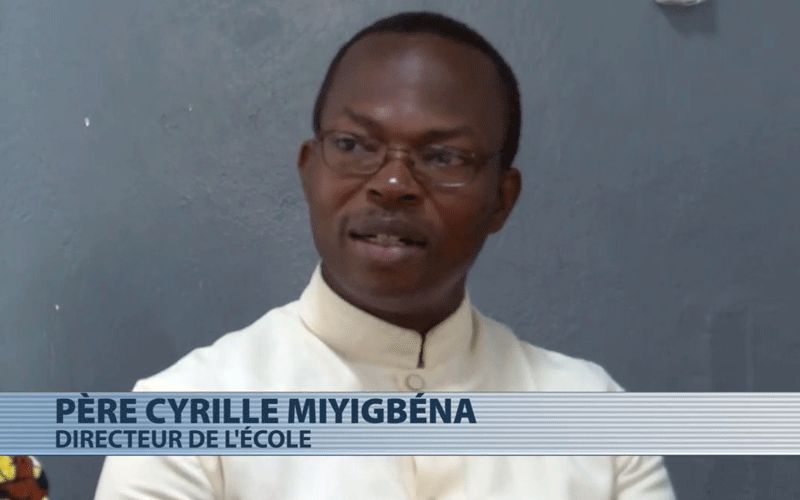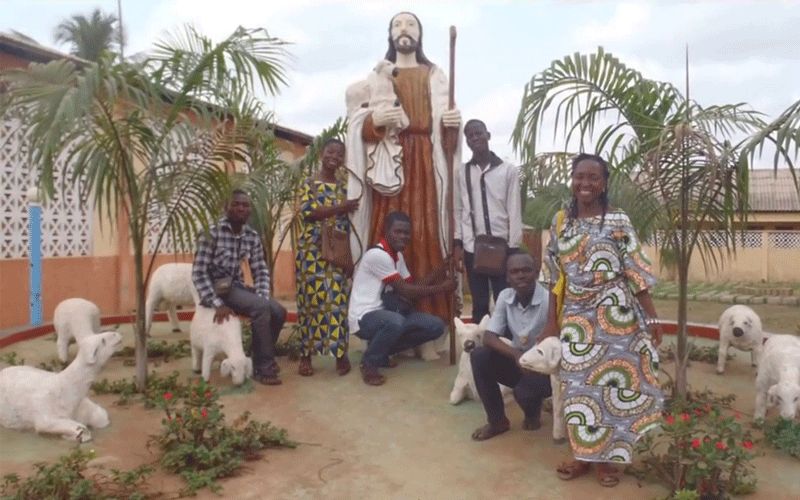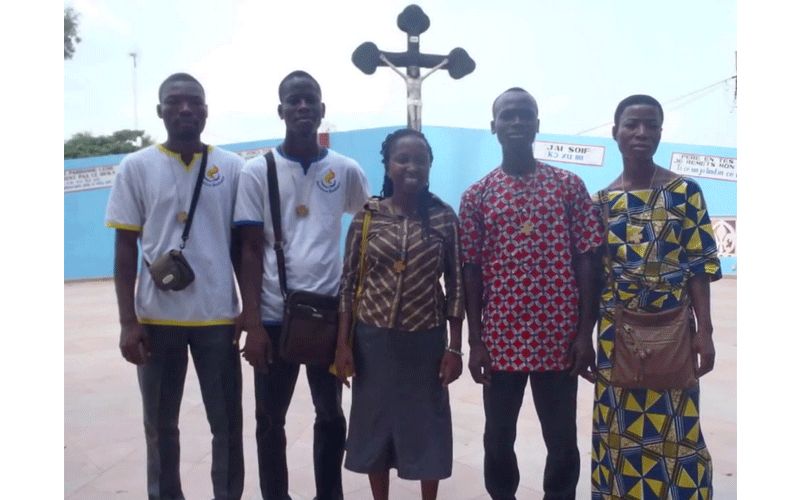“I immediately opened up to my then Archbishop, Msgr. Nestor Assogba, and told him of my desire to found a school of the same kind in our diocese,” he said, adding that the project was immediately approved by the Archbishop and the Council of the Archdiocese.
But Fr. Cyrille had to first enroll for a year of formation at the Catholic School of Prayer and Evangelization in Europe to have a feel of what the program entailed, before starting it back home in Benin.
“Although the school is for young people, I decided, in agreement with its founder, Father Daniel-Ange, to live the year with the young people and in the same way as them, without any particular pastoral ministry,” he narrated his 2002 experience at the school in Europe.

He added, “This plunge, not an easy one, I must admit, allowed me to discover the School from within, to penetrate its spirituality and above all confirmed me in the call I felt to implant it in Benin for our young people who are so much in need of an in-depth Christian formation.”
(Story continues below)
More than 10 years later, “with a lot of preparation”, École Jeunesse Bonheur was established and was blessed in 2014 by Fr. Daniel, the brains behind the idea of lay formation of youths in Europe.
Top on the factors behind the establishment of the school, according to the Beninese Cleric, is the situation of young people in the world at the time of establishment.
“Contemporary youth are confronted with many and varied problems and challenges of an economic, socio-cultural, ethical, psycho-affective, anthropological and religious nature,” he said.

He continued, “Due to the phenomenon of massification and the globalization of contemporary society, these evils have become a real pandemic; they are diffused among the youth of the whole world, and therefore also among the youth of Benin.”
To address challenges facing young people, the Church has various pastoral activities that engage this group which, however, are mostly one-off and not long-term, according to Fr. Cyrille. As such, he said, the activities do not have a profound spiritual impact on the personality of young people.
The 47-year-old Cleric told ACI Africa that the objective of the school aligns itself to the recommendation by Pope John Paul II who, on 9 August 2004, a few months before his death, “urged the Diocesan Service for Youth Ministry to study new proposals for creating true and specific schools of evangelization for young people.”
The École Jeunesse Bonheur is the first school of its kind in Africa and the fourth in the world, after those in France, Poland and Italy with which it forms the same spiritual family, the Communion Jeunesse Lumière, Fr. Cyrille told ACI Africa.

A young person who goes to École Jeunesse Bonheur spends nine months at Christ's school with a minimum of three hours of prayer a day, Fr. Cyrille who also ministers at the Parish of Notre-Dame de la Visitation of Benin’s Cotonou Archdiocese said.
He added in reference to anyone enrolled at the school, “As such, he (or she) is supposed to have experienced a gradual transformation of his whole being which is manifested in his spiritual depth, his great attachment to Christ, to Mary his Mother and to the Church his spouse.”
Such a young person, the Cleric elaborated, also develops such human virtues as punctuality, fraternity, hard work, honesty, a sense of gratitude, sacrifice and responsibility and an overall true human and spiritual maturity.
As an international school, the institution welcomes not only young people from Benin but also those from other African countries and from around the world hence serving as “a melting pot for the training of young Christian leaders.”

The school also allows an affective maturity through what Fr. Cyrille refers to as a “Celibacy of Love” where boys and girls live in a climate of chastity, as brothers and sisters, in order to keep their hearts free for prayer and mission.
The year at École Jeunesse Bonheur is, finally, a time to discern one’s vocation where young people are allowed to discover their path towards holiness in marriage, religious life, priesthood and consecrated laity.
In six years, École Jeunesse Bonheur has welcomed about a hundred young people from nine different countries, most of them west African countries. The institution has carried out 89 missions in 60 localities, including towns and villages in Benin and in neighboring Togo, Fr. Cyrille told ACI Africa.
He noted that among the young people trained, a significant number have signed up for voluntary work at the institution and are now giving a year of their lives in the service of ecclesial works or institutions in various dioceses in Benin and elsewhere.

The formation has also impacted on vocations in the Archdiocese of Cotonou.
“Among the young people formed during these first five years, there are, in fact, fifteen seminarians, seven who have entered Religious Life, five marriages, and ten babies have already been born,” Fr. Cyrille happily noted.
The criteria for admission into the school is simple, the Cleric said. One has to be a Christian, willing to be Christian or willing to live Catholic Christian values and is therefore recommended to obtain a letter of recommendation from his or her Parish Priest.
Young people aged between 18 and 30 years are also allowed to apply after completing High School, tertiary institutions or early career professionals.
“You must be available for a whole year and agree to take a free school year, end of September to end of June, to put yourself at Christ's school. You must agree to leave everything, studies, work, home, family for nine months,” Fr. Cyrille clarified, adding that applicants must also be willing to find sponsors to cover part of the 500,000 F (US$.900.00) cost for the entire training.

“The school offers free accommodation, human, spiritual, doctrinal and missionary training, primary care, water and electricity, and laundry services to the young people. It only asks them to pay for their own food, which amounts to 30,000 F (US$.54.00) per month,” he said.
The Cleric further explained that “in order to finance his or her year, each young person admitted to the School is invited to look for twenty ''godparents'' who will take care of him or her, at a rate of 1,500 F per month.”
He added, “It is possible that part of this sponsorship may be in kind, by means of food (maize, rice, beans, fish, meat, etc). But as the young people rarely manage to cover their expenses, we have set up agro-pastoral activities of self-support such as gardening, breeding, pastry making, fruit juice production, making rosaries, etc.”
In situations where candidates are not able to raise the required funds, “this should not be an obstacle,” Fr. Cyrille told ACI Africa.
He clarified that “situations are studied on a case-by-case basis” and that every year, about ten young people from foreign countries and disadvantaged backgrounds in Benin benefit from a full training grant at the school.
This story was first published by ACI Africa on 19 September 2020

















